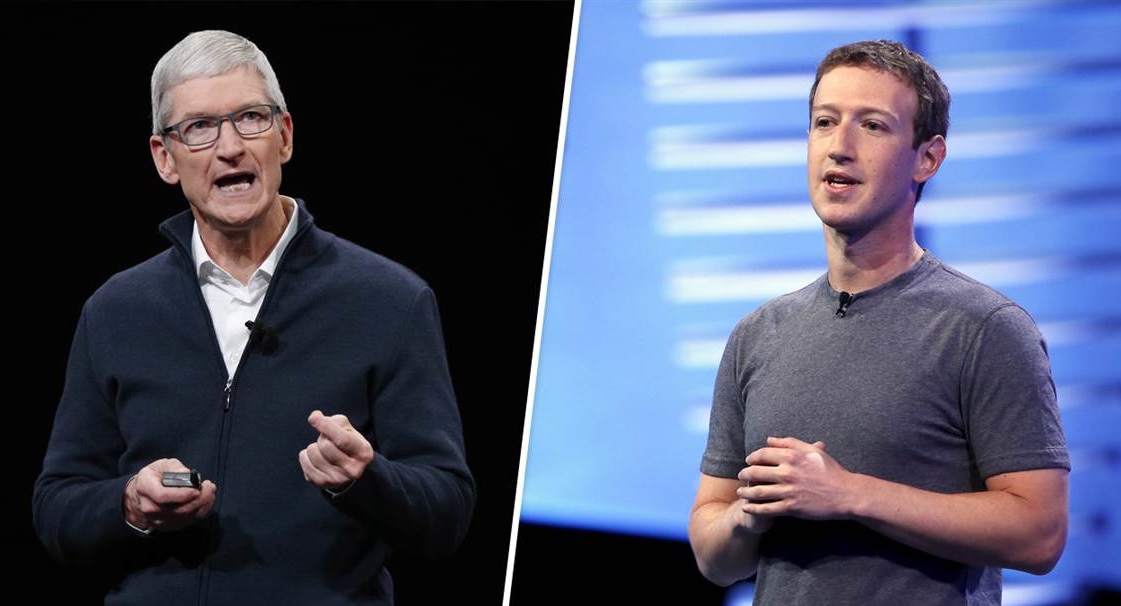Competitions are common between companies in general. Big corporate rivalries in the likings of Coca Cola and Pepsi, Boeing and Airbus, McDonald’s and Burger King tend to have one thing in common, competition for the same business. That’s why Facebook and Apple’s feud is so intriguing.
They’re both big companies, and that’s where the similarities end and in the technology industry there are two companies that have been at odds with each other for years, namely Apple and Facebook, whether it is a matter of privacy or a dispute between CEOs over some issues, it is clear that Facebook and Apple do not like each other, Where Apple launched iOS 14 to introduce a new feature that will harm Facebook, which is the latest cause of friction between the two tech giants, and there are some substantial reasons why Apple and Facebook do not agree.
Almost all of Facebook’s revenue is from advertising but it provides only a small fraction of Apple’s, which comes mostly from devices and its App Store. The two companies don’t really compete with each other – they just don’t like each other.
Earlier this year, Apple announced it would introduce a feature called App Tracking Transparency, to give people more control over their data.
Crucially, customers would have to opt in for their data, previously handed over by default to be used by apps such as Facebook’s. That is a massive problem for Facebook, which sells targeted adverts to make eye-watering profits. It says openly that this will damage its business. Apple has postponed the proposed changes until next year, to give developers time to prepare.
In a letter outlining why the change was delayed last week, Apple’s Jane Hovarth couldn’t resist a pop at Zuckerberg: “Facebook executives have made it clear their intent is to collect as much data as possible. This disregard for user privacy continues to expand.”
Facebook hit back, saying: “They are using their dominant market position to self-preference their own data collection, while making it nearly impossible for their competitors to use the same data. They claim it’s about privacy – but it’s about profit.”
That is like rubbing salt into an open wound for Apple, which takes genuine pride in its belief it has a loftier business model than Facebook. Although Apple’s advertising business is comparatively small, Morgan Stanley predicts that Apple’s revenue from advertising will grow sharply in the next few years. So does it want to stop Facebook harvesting user data just to cash in itself? That would be an intellectually strange thing to do.
As far back as 2010, Apple co-founder Steve Jobs reportedly warned Facebook about privacy. And in 2018, Mr. Cook, Apple’s current boss, said he could have followed Facebook by using data to sell ads but we elected not to do that.
In 2014, when Mr. Cook first publicly criticized Facebook for treating its customers as a product, the Facebook chief executive hit back, engaging with the media that, “A frustration I have is that a lot of people increasingly seem to equate an advertising business model with somehow being out of alignment with your customers. He further added, “What, you think because you’re paying Apple that you’re somehow in alignment with them? If you were in alignment with them, then they’d make their products a lot cheaper.” And perhaps he has a point as Apple is one of the wealthiest companies in the world.
The two CEOs don’t like each other. Tim Cook and Mark Zuckerberg have often come out in public, and have engaged in a war of words, though indirectly, but it had happened on numerous occasions. The core of the dispute for Apple has always been the privacy.
Apple’s App Store policies have caused Facebook to hurt a lot. Apple has toppled some Facebook apps over privacy concerns, something Facebook never liked. In reaction to the Apple App Store updated policies, Facebookban its employees from using iPhones.It wasn’t a blanket ban as such, but in a blog post, Facebook urged its employees to use Android because it was the most popular mobile operating system in the world.
When it comes to user data and privacy, Apple has always emphasized how careful it is, on the other hand, Facebook has discovered that it is the opposite and this is something Apple has always criticized the company for. On contrary to that with iOS 14, Apple is set to introduce a new feature that will give users more control over the data that they can share with apps and websites, as Facebook believes this will harm its advertising model and those apps and small businesses that rely on data.
Apple does not allow a specific game application to be used by Facebook. The Facebook games app was rejected 5 times by Apple, as Apple finally approved the app but with a lot of caveats, and it did not fit Facebook well.
Apple expert “Carolina Milanesi” is one of many who believe the two companies just see the world in a different way and the animosity between them is cultural and personal. She while expressing her views said, “When you’re looking at Apple, if they feel so strongly about how Facebook is behaving against their customers, then why do we have Facebook as an app on Apple devices? And that gets to the nub of the issue. Until now, this has been two companies not getting along. But it’s been a phoney war; their relationship has actually been symbiotic.”
What Apple is now proposing, however, is far from war of words. Make no mistake about it; it is an obsession with privacy is not good for Facebook. Its new rules which are introduced in newly updated software iOS14 will hurt the social network; mostly grabbed by the Facebook.
Of all the likely rivalries in big tech, Facebook vs Apple seem, on the face of it, the least likely. Google is Facebook’s obvious competitor; Microsoft and Google is Apple’s sub branch. But the issue of privacy has stoked a fire between Facebook and Apple that won’t go out. And it’s more likely that we will see that rivalry rage still further even in 2021.

The author is doing M. Phil in Public Policy and Governance. He is working as a freelancer. Previously worked with HubPages and Washington Post.
